MANGOES SWEETEN TRADE TIES BETWEEN CHINA, BANGLADESH
Fruit growers look to capitalize on burgeoning domestic market after policy shift on exports





At a colorful fruit market in Changsha, Hunan province, Gui Jirong and his friends are all enticed by the sweet aroma of mangoes filling the air.
Despite the imperfect appearance of the produce on display, one of the sellers tells Gui these mangoes from Bangladesh are renowned for their excellent quality and flavor, with several varieties popular around the world.
"At first, I was hesitant to try these mangoes because the skin looked a bit spotted and uneven — definitely not 'perfect'. But after trying one, I was completely won over," Gui said.
"The flesh is incredibly smooth and sweet, and it has a deep tropical flavor, regardless of how they look. There's no stringy texture at all. Now I don't care what they look like — I am waiting for them to be available online."
As China and Bangladesh strengthen their economic ties, several of the most popular mango varieties from the South Asian country have recently made their way into the Chinese market. Bangladeshi mangoes are known for their fine texture, high sugar content, and tropical fragrance.
In early June, some of these high-quality mangoes were introduced to the Chinese market, and traders said they have continued to win over Chinese consumers.
Kohinoor Kamal, chairwoman of the Meridian Group, a supplier of premium Bangladeshi mango varieties, said one of her wishes had been fulfilled with the export market opening up and Chinese consumers being able to sample the delicious fruit.
"Over the past few years, we've actively expressed our interest in exporting mangoes to our Chinese partners," Kamal told China Daily. "However, due to the absence of a G2G (government-to-government) protocol, we were unable to proceed earlier."
Export doors opened
In July 2024, Bangladesh received approval from the General Administration of Customs to export fresh mangoes to China. Kamal said she and her colleagues were grateful to Chinese and Bangladeshi government officials for their efforts to expedite the necessary protocols.
"Their support motivated us to persevere, and ultimately, we secured a buyer and fulfilled all compliance requirements," she said. "We sincerely appreciate our Chinese partners' trust in us and in Bangladeshi mangoes."
Meridian Group's subsidiary Meridian Agro was able to act promptly once the protocols were in place, Kamal said.
On May 28, Meridian became the first Bangladeshi company to export mangoes to China, when 3 metric tons of the fruit arrived in Changsha in the evening. To streamline the process, Changsha Customs provided end-to-end support, including policy consultation and quarantine approval, Xinhua News Agency reported.
At Changsha Huanghua International Airport, a dedicated "fresh express" team ensured speedy, on-arrival inspection with a tailor-made clearance plan.
"We see a promising opportunity to tap into this largely untapped segment," Kamal said. "We believe the shipment is the first step toward a large milestone in China-Bangladeshi bilateral ties in the agro-sector."
Bill Wei, investment director for the importer Hunan BabaiLi Holding Group, is also optimistic about the growth potential of Bangladeshi mangoes in the Chinese market.
His company is involved in air freight operations and international trading, and has strong domestic distribution channels. He said the first shipment of mangoes was mainly distributed as samples to downstream partners, including e-commerce platforms, supermarkets, and fresh produce chains.
The distinctive flavor and aroma of Bangladeshi mangoes set them apart from domestic and other foreign varieties, he said. Despite their "average" appearance due to Bangladeshi farmers' natural cultivation methods they are highly prized by Chinese consumers, Wei said.
His company's focus is on selling to consumers who are more aware of the benefits of naturally cultivated and chemical-free mangoes.
"The aroma from these Bangladeshi mangoes is noticeable the moment you open the box," said Zou Qiuhong, a wholesale procurement manager at an online platform operating in South China. "We are particularly amazed by their smooth texture with no fiber, and are already in talks about procurement procedures," she added.
Market potential
Bangladesh is forecast to produce around 2.7 million tons of mangoes in 2025, with about 5,000 tons planned for export, according to the Bangladeshi government's Department of Agricultural Extension.
"The entry of Bangladeshi mangoes into the Chinese market will not only help expand the bilateral trade volume and improve trade imbalances, (but) more importantly, it reflects the mutually beneficial and win-win essence of our economic cooperation," said Chinese Ambassador to Bangladesh Yao Wen.
Yao and Bangladeshi Commerce Adviser Sheikh Bashir Uddin, were at Hazrat Shahjalal International Airport in Dhaka, the nation's capital, to see the first mango shipment to China depart.
Yao expressed special thanks to Bangladesh's Ministry of Commerce, Ministry of Agriculture, and Export Promotion Bureau for their contributions, which helped make the inaugural export a reality.
Grown in the fertile soils of the Ganges Delta, Bangladeshi mangoes represent green and high-quality agricultural products, Yao said. For Chinese consumers, the mangoes mean more diverse choices in their shopping baskets that will enhance people's well-being, Yao added.
For Bangladesh, the vast potential of the Chinese market will directly drive industrial upgrading in the mango sector, create more employment opportunities, and contribute to Bangladesh's socioeconomic development.
Muhammad Yunus, chief adviser to the Bangladeshi interim government, visited Beijing earlier this year, Yao said, and the export of Bangladeshi mangoes to China marks a concrete step in implementing the outcomes of that visit.
"I see strong and growing prospects for mango exports to China," said Razia Sultana, a Bangladeshi mango exporter.
The Chinese market has shown increasing demand for high-quality tropical fruits, and mangoes are gaining in popularity due to their flavor and nutritional value, said Sultana, proprietor of Global Trade Link, which exports premium-quality fresh fruits, vegetables, and spices worldwide. GTL is listed as a mango exporter to China.
"With China's large consumer base, rising middle class, and expanding interest in imported fruits, there is significant potential for growth," Sultana said.
However, she said success depends on meeting China's strict phytosanitary standards, ensuring consistent supply chains, and building strong distribution partnerships.
Sultana added that with the right strategy, China can become a key export destination for her country's mangoes in the coming years.
Bangladeshi fruits are known for their unique taste and organic cultivation methods, which can appeal to health-conscious Chinese consumers, she added.
Strong competition
Bangladeshi mango exporters, however, face strong global competition to gain a sizable share of the Chinese market.
Several mango-exporting countries — such as Thailand, Vietnam, the Philippines, Pakistan and Peruare already active in the Chinese market, and these countries often have trade agreements or geographical advantages, which can affect pricing and market share, Sultana said.
Despite the competition, with the right approach there is room for success in the Chinese market, she said.
"To strengthen their own position, it's essential to focus on strict quality control, modern packaging, cold chain infrastructure, and compliance with China's phytosanitary regulations," said Sultana.
Apart from China, the key export markets for Bangladeshi mangoes include the Middle East, Asian countries, Canada, and the European Union, said Kamal, from Meridian.
"What sets Bangladeshi mangoes apart is their juiciness and sweetness, which is a byproduct of our soil and climate," she said.
"More importantly, at Meridian Agro, we focus on natural harvesting and healthy products. Our traditional farming methods and near-organic harvesting practices cater to the growing demand for natural and healthy produce."
While the company has a longstanding trade relationship with China, primarily through imports, Kamal said the Chinese market remains a major opportunity.
Mohammad Kalim Uddin, senior figure in supply chain management for the Meridian Group, said the company plans to replicate its existing overseas marketing strategies, emphasizing quality and organic production to penetrate the Chinese market. Meridian also has its own nursery development, and extends its nursery capacity every year, he said.
China expects to sell over 100 tons of Bangladeshi mangoes in the first year of sales, according to Xinhua.
Fruitful future
Bangladeshi growers are now eyeing exports of guavas and jackfruits — fruits they have in abundance — to China.
Exporting to China involves several compliance steps, notably registering with the Plant Quarantine department, and registering on the General Administration of Customs of China's platform. After completing these procedures, the remaining export processes align closely with European Union standards.
Ambassador Yao said he is confident that the export of Bangladeshi mangoes is just the start, adding that China has already initiated market access reviews for Bangladeshi guava and jackfruit.
"We are discussing imports of raw animal hides from Bangladesh, and look forward to the export of hilsa (the national fish of Bangladesh) to China," he said.
"I am confident that in the near future, an increasing number of high-quality Bangladeshi agricultural products will be stocked on the shelves of Chinese supermarkets, bringing more tangible benefits to the peoples of both countries," Yao added.
Sultana, of GTL, agreed that the Chinese market presents a promising opportunity for Bangladeshi fruit exports, particularly mangoes, guavas, and jackfruits.
"China's growing appetite for exotic and tropical fruits aligns well with Bangladesh's strengths in producing flavorful, naturally ripened fruits," she said.
The recent openings for mango exports show positive diplomatic and trade relations, and a mutual interest in agricultural trade, Sultana said. "Overall, with strategic investment in quality and branding, Bangladesh can become a significant supplier of tropical fruits to China, tapping into a lucrative and growing market," she said.
The relationship goes both ways, as seen in the northwestern region of Chapai Nawabganj, about 300 kilometers from Dhaka.
Known as the "Mango Capital", the region is famous for its high-quality, chemical-free mangoes. In recent years, Chinese bagging technology, a safer alternative to chemical pesticides, has gained popularity among local growers.
This year marks the 50th anniversary of diplomatic ties between China and Bangladesh. In recent years, bilateral economic cooperation has deepened significantly, with China serving as Bangladesh's largest trading partner for 15 consecutive years.
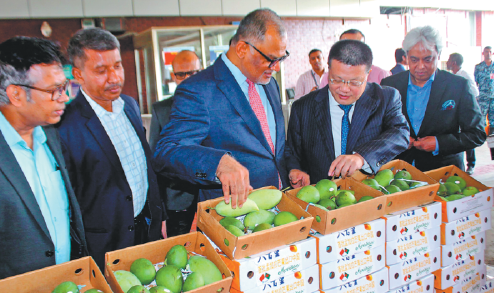
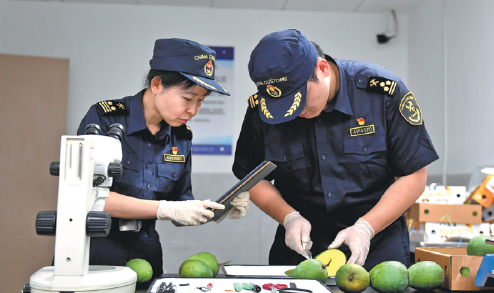
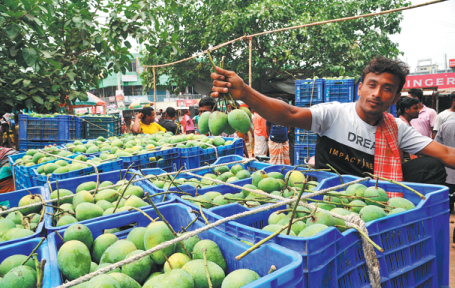
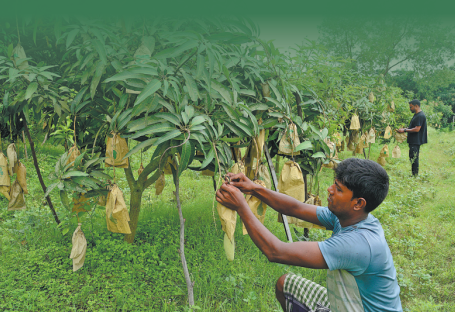
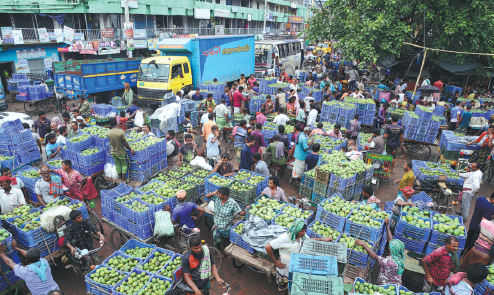
NK Sanchaya is a freelance journalist for China Daily.
Today's Top News
- Poll findings indicate Taiwan people's 'strong dissatisfaction' with DPP authorities
- Xi emphasizes strong start for 15th Five-Year Plan period
- PLA drills a stern warning to 'Taiwan independence' separatist forces, external interference: spokesperson
- Xi, Putin exchange New Year greetings
- ROK leader's visit to help boost bilateral ties
- China's new plan, world's new opportunities


























